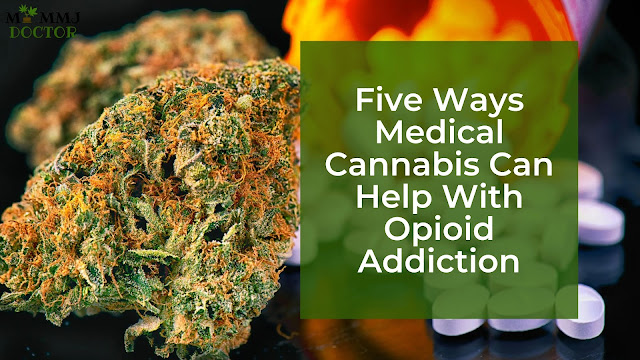Five Ways Medical Cannabis Can Help With Opioid Addiction
Every year, hundreds of people are killed by the opioid epidemic. Furthermore, an estimated 2.5 million people suffer from opioid use disorders, which jeopardise their health, happiness, relationships, and lives. Many people remain addicted to opioids despite a strong desire to rehabilitate due to factors such as stigma, limited resources, and a lack of access to medicine for opioid-use disorder (MOUD) therapies. The fact that the age group between 25 and 34 has the highest rate of opioid overdose deaths indicates that too many individuals are being killed in their prime by a preventable public health disaster.
Medical marijuana (MMJ) has recently emerged as a viable opioid addiction treatment. Many Floridians are now considering utilising medicinal marijuana to escape the cycle of opiate addiction. What's particularly intriguing about marijuana for opiate addiction is that it appears to have both preventive and curative properties. Here are five ways marijuana has the potential to aid in the treatment of opiate addiction.
1. Medical Marijuana Use May Reduce Opioid Addiction
A number of studies have been conducted in recent years to investigate how medicinal marijuana can be used to assist ease symptoms in people suffering from opiate addiction. Researchers and public health professionals are increasingly seeing opioid use decline in areas where marijuana use is increasing. According to a 2018 research, when medical marijuana legislation went into effect, opioid prescriptions issued under Medicare Part D declined by 2.11 million daily doses per year by state.
All of this is especially beneficial for those who are presently in recovery. Accidents, injuries, and life situations can all give rise to genuine causes for a pain-management prescription. If a person has a history of opioid addiction, medicinal marijuana may be an alternate pain-management choice that can help them prevent relapse.
2. Medical Cannabis Could Help With Withdrawal Symptoms
Cannabis may aid those who are recovering from opiate addiction to relieve withdrawal symptoms. Marijuana's medicinal benefits can assist to alleviate the chills, physiological discomfort, nausea, and mental tension that often accompany the withdrawal process. Using marijuana to make opiate detox more bearable can improve a person's odds of not relapsing into opioid dependence.
3. Marijuana Can Assist in Reducing Craving Behaviors
A 2019 study looked at the ability of cannabidiol to diminish cue-induced cravings in drug-free people. Cannabidiol decreased desire behaviours produced by the display of drug signals when compared to placebo. Furthermore, the effects may be assessed seven days after exposure.
4. Marijuana Could Help With Anxiety
People who self-medicate with opioids for mental-health disorders such as anxiety may benefit from medical cannabis. Indeed, preclinical data convincingly shows that CBD is useful for lowering anxiety behaviours associated with the following:
- Anxiety disorder in general (GAD).
- Anxiety disorder (PD).
- Post-traumatic stress disorder (PTSD) (PTSD).
- Obsessive-compulsive syndrome (OCD).
- Seasonal Affective Disorder (SAD) (SAD).
5. Marijuana Could Help Relieve Chronic Pain in People Who Have a History of Opioid Use
People who get addicted to opioids after being administered drugs have a true dread of living life in excruciating agony after discontinuing narcotics. Many people who have never used recreational drugs before get addicted to opioids after suffering from chronic pain as a result of an accident, a workplace injury, a sports injury, or surgery. A marijuana prescription has the potential to provide long-term, substantial pain management without the negative physical, psychological, and social consequences associated with opiate use. Here are the findings of a cross-sectional survey of chronic pain patients:
- Cannabis consumption was connected with a 64% reduction in opiate use in chronic pain sufferers.
- Cannabis consumption was linked to a higher quality of life in chronic pain sufferers.
- Marijuana use was linked to reduced pharmaceutical side effects.
- Cannabis consumption was linked to fewer drugs being utilised.
There is lots of well-documented data to back up assertions that MMJ is useful for chronic pain management. MMJ appears to be highly effective for the treatment of neuropathic and spasticity-related pain. Cannabinoids assist to block the release of neurotransmitters and neuropeptides from nerve terminals while also limiting neuron excitability, which helps to inhibit pain pathways and diminish neural inflammation. In a 2014 research on the patterns of medicinal cannabis usage among cancer patients, 70% reported improvements in pain and general well-being after using marijuana.
Make an Appointment with My MMJ Doctor for Comprehensive Medical Marijuana Evaluation Services.
Read more about : What is medical marijuana card



Comments
Post a Comment